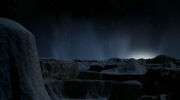(+info from "Fortunate Son") Tag: sourceedit |
NewDay080120 (talk | contribs) No edit summary |
||
| (10 intermediate revisions by 5 users not shown) | |||
| Line 1: | Line 1: | ||
[[File:Archers Comet.jpg|thumb|The nucleus of Archer's Comet]] |
[[File:Archers Comet.jpg|thumb|The nucleus of Archer's Comet]] |
||
| ⚫ | '''Archer's Comet''' was a [[comet]] {{dis|discovery|observation|discovered}} by {{EnterpriseNX}} in [[2151]]. With a [[diameter]] of 82.6 [[kilometer]]s, the comet was the largest ever observed by [[Human]]s or [[Vulcan]]s. It was named after {{Captain}} [[Jonathan Archer]], following confirmation that it was not listed in the [[Vulcan database]]. |
||
| ⚫ | |||
| ⚫ | |||
| ⚫ | |||
| ⚫ | Initially disregarded as merely "[[rock]] and [[ice]]" by [[Sub-Commander]] [[T'Pol]], upon further analysis it was discovered to contain large quantities of [[eisillium]] located under a twenty-[[meter]] thick layer of [[magnesite]]. Since eisillium was extremely rare, {{Captain}} [[Jonathan Archer]] suggested obtaining a [[sample]] with the [[transporter]]. With the layer located out of [[transporter range]], [[Lieutenant]] [[Malcolm Reed]] suggested making use of the portable [[drilling rig]] with [[Ensign]] [[Travis Mayweather]]'s assistance. |
||
[[File:Archers Comet surface.jpg|thumb|The surface of Archer's Comet]] |
[[File:Archers Comet surface.jpg|thumb|The surface of Archer's Comet]] |
||
| + | [[File:Dawn at Archer's comet.jpg|thumb|left|Dawn at Archer's Comet]] |
||
| ⚫ | |||
| ⚫ | During the "comet walk," the drilling team experienced several setbacks, including a broken [[drill bit]] due to a layer of magnesite, a [[Rotation|rotational]] [[axis]] shift resulting in the [[dawn]] approaching sooner than expected causing the [[temperature]] to increase by several hundred {{dis|degree|temperature}}s, and the ''{{dis|Shuttlepod 1|2151}}'' falling into a chasm due to melting ice. ''Enterprise'' attempted to use the [[grappler]] and pull the {{dis|shuttlepod|22nd century}} to safety. However, a secure hold could not be obtained. The drilling team was eventually rescued by the Vulcan [[starship]] ''[[Ti'Mur]]'' [[commanding officer|under command of]] Captain [[Vanik]]. ({{ENT|Breaking the Ice}}) |
||
| ⚫ | |||
| − | |||
| ⚫ | Initially disregarded as merely "[[rock]] and [[ice]]" by [[Sub-Commander]] [[T'Pol]], upon further analysis it was discovered to contain large quantities of [[eisillium]] located under a twenty-meter thick layer of [[magnesite]]. Since |
||
| − | |||
| ⚫ | During the "comet walk," the drilling team experienced several setbacks, including a broken drill bit due to a layer of magnesite, a rotational axis shift resulting in the dawn approaching sooner than expected causing the temperature to increase by several hundred |
||
| − | |||
| ⚫ | |||
| ⚫ | |||
| − | {{bginfo|In the writers' second draft of "Breaking the Ice", this comet was instead named "Comet Archer" and was said to have a diameter of forty-eight point six kilometers. It was described as having been traveling through space for the past ten billion years and be scheduled to orbit within fifty kilometers of its sun in twenty-seven days since its discovery by ''Enterprise''. Also, it was theorized that, during the past ten billion years, the comet had orbited around its sun only a few times. |
+ | {{bginfo|The scenes on the surface of the comet were filmed on Monday {{d|10|September|2001}} on [[Paramount Stage 9]]. ("Call sheet")|In the writers' second draft [[script]] of "Breaking the Ice", this comet was instead named "Comet Archer" and was said to have a diameter of forty-eight point six kilometers. It was described as having been traveling through space for the past ten [[billion]] years and be scheduled to [[orbit]] within fifty kilometers of its [[sun]] in twenty-seven days since its discovery by ''Enterprise''. Also, it was theorized that, during the past ten billion years, the comet had orbited around its sun only a few times. In the first draft script of "Fortunate Son", Archer mentioned that the scans of the comet didn't do justice to actually seeing the comet in person, and Admiral Forrest wrily answered he had been told the comet would be visible from [[Earth]] in approximately ten thousand years.|According to the [[reference works|reference book]] ''[[Star Trek: Star Charts]]'' (p. 60), this comet was discovered by the ''Enterprise'' in the [[Beta Quadrant]].}} |
[[de:Archer-Komet]] |
[[de:Archer-Komet]] |
||
Revision as of 22:44, 18 September 2020
The nucleus of Archer's Comet
Archer's Comet was a comet discovered by Enterprise NX-01 in 2151. With a diameter of 82.6 kilometers, the comet was the largest ever observed by Humans or Vulcans. It was named after Captain Jonathan Archer, following confirmation that it was not listed in the Vulcan database.
Enterprise passes the tail of Archer's Comet
Initially disregarded as merely "rock and ice" by Sub-Commander T'Pol, upon further analysis it was discovered to contain large quantities of eisillium located under a twenty-meter thick layer of magnesite. Since eisillium was extremely rare, Captain Jonathan Archer suggested obtaining a sample with the transporter. With the layer located out of transporter range, Lieutenant Malcolm Reed suggested making use of the portable drilling rig with Ensign Travis Mayweather's assistance.
The surface of Archer's Comet

Dawn at Archer's Comet
During the "comet walk," the drilling team experienced several setbacks, including a broken drill bit due to a layer of magnesite, a rotational axis shift resulting in the dawn approaching sooner than expected causing the temperature to increase by several hundred degrees, and the Shuttlepod 1 falling into a chasm due to melting ice. Enterprise attempted to use the grappler and pull the shuttlepod to safety. However, a secure hold could not be obtained. The drilling team was eventually rescued by the Vulcan starship Ti'Mur under command of Captain Vanik. (ENT: "Breaking the Ice")
Scans of the comet were reported by Enterprise to Starfleet Command, where Admiral Maxwell Forrest found them "incredible." He later relayed this enthusiasm to Archer. (ENT: "Fortunate Son")
